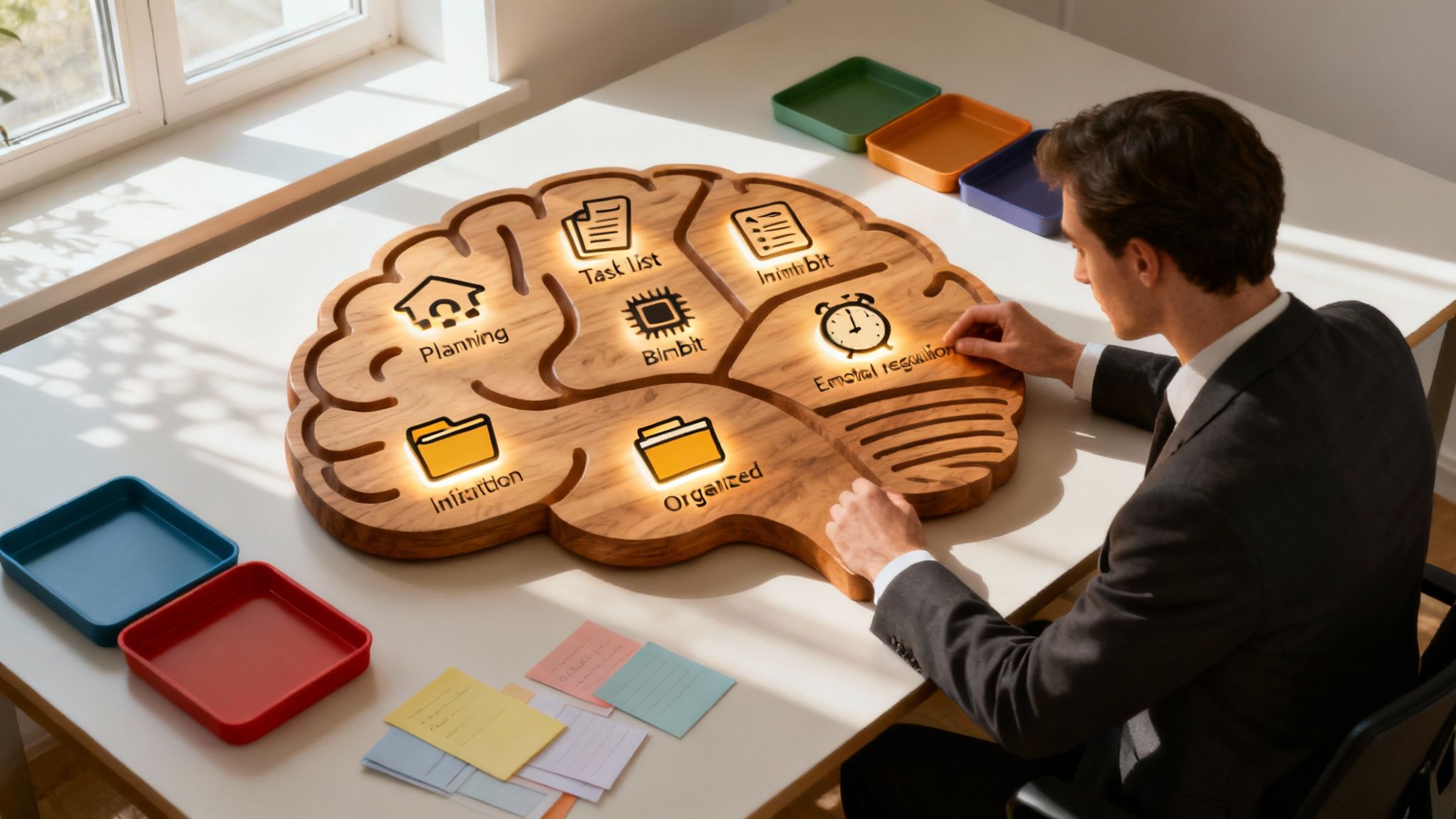I remember vividly the day I’d finally had enough. The dishes were piling up in the sink, my dirty clothes were all over the floor, my email inbox was overflowing, and I’d forgotten to pay my utilities… again.
While I knew that I should “just do it,” something stopped me every time. The overwhelm was so great, it was painful.
Feeling defeated, I sat down on the one chair that didn’t have a stack of unsorted mail on it... and I sobbed. I couldn’t understand it. If avoiding the things I needed to do was making me so miserable, why couldn’t I stop?
Years later, as an ADHD coach, I understand chronic procrastination a lot more than I used to. I’m still amazed by how much we talk about procrastination itself, yet talk so little about why it happens.
So why are you stuck? Let’s explore.
The top 5 reasons for ADHD procrastination
1. Perfectionism
Many of us believe that if we can’t do a task perfectly, there’s no sense in starting at all. This is a myth, though.
You can start a task even if you aren’t sure how it'll turn out. You can figure things out as you go along. You can do a “good enough” job instead of a perfect job. You can even ask for support if you don’t know where to begin!
It’s a wild concept, I know.
So, why do we get stuck on perfection?
People with ADHD often struggle to find internal motivation, leading us to rely on others to help us get going — especially when we're young. If the adults in our lives told us we weren't measuring up, we slowly learned that to be lovable, we had to be perfect.
This can lead us to become self-critical adults who are afraid to attempt something, only to fail.
Where do we go from here?
You have to practice being kinder to yourself. And it might feel strange at first (it still does for me), but when you hear your inner critic getting loud — telling you that you’re lazy, or that you’ll never be enough — it’s time to talk back. Stand up for yourself.
Practice approaching yourself like you would a close friend. What would you say to them in this moment of struggle?
2. Overwhelm
Does your task feel more like a mountain? Don’t know where to begin?
Welcome to the Overwhelm Club. Overwhelm can be an uncomfortable emotion, which is why so many of us try to avoid it. (Your social media news feed is probably looking pretty tempting right about now. Or that game of Candy Crush. Or, well, literally anything but what you’re supposed to be doing.)
How did I end up so overwhelmed?
When we’re overwhelmed, this usually means that we haven’t yet broken down the task. Instead, it feels too complex to begin.
What’s next for me?
Break down that task into smaller tasks. And then keep breaking it down. Write it out, too, so you can start checking things off.
For example:
- “Open laptop”
- “Stand near sink”
- “Put socks on”
Break down your task until the overwhelm subsides (at least a little), and you’re clear on where you should begin.
3. Panic
Many people with ADHD also have anxiety disorders. This statistic is not surprising — having ADHD, and feeling like you’re constantly falling behind or messing up can be very anxiety-provoking.
Is it possible that you’re having a panic or anxiety attack?
You’ll know this because your body will tell you so. Look for these signs:
- Is your heart racing?
- Are your palms sweating?
- Are your breaths quick and short?
- Do you feel like you need to crawl out of your skin?
Did you say “yes” to those?
Yeah, you’re probably panicking.
Okay, I already knew I was panicking. So, what do I do?
You need a break to reset.
Panic and anxiety stem from the central nervous system (CNS).
So to self-soothe, we need to come back to the body. The best way to do this is through our breath. You might try inhaling through your nose for 7 seconds, holding your breath for 4 seconds, and then exhaling through the mouth for 8 seconds.
Another way to soothe our nervous systems is to engage our senses.
Try listening to music you enjoy, tasting something you like, dancing around, or lighting a candle — connect with your body in whatever way makes sense for you!
4. Boredom
When you have ADHD, boredom can be painful — mentally, and even physically so. Because our brains tend to lack dopamine, which is responsible for our reward response, our ability to take action is impaired.
But don't lose hope! There are easy we can boost our dopamine!1
What increases dopamine?
It starts with something called “novelty,” which is the quality of newness or unfamiliarity that makes things more interesting to our brains.
Novelty increases the levels of dopamine and its receptors in our brains, which ultimately helps us get motivated to finally start on or resume our tasks.2
How do I get out of this funk?
You’ll need to make this task more interesting to you.
To start, commit to doing this task for five minutes only. From there, think about how to make those five minutes more exciting. You might eat hard candy, listen to an upbeat song, or try to “beat the clock” with a timer. Don’t worry about completing the whole task yet.
Motivation usually kicks in after we’ve started a task.
Focus on making those five minutes more exciting, and the rest will likely follow.
5. Isolation
Research shows that children with ADHD were more likely to take action if they had "extrinsic motivation".3
❓ Science translation: The ADHD kids struggled to find motivation entirely on their own. It’s no secret that people with ADHD do better when there’s accountability involved… and without it, we’re more likely to procrastinate.
Who am I accountable to?
When you answer this, I don’t just want you to tell me when the deadline is and who’s expecting it. I mean, who are you in communication with — right now — to work through the task ahead? If the answer is “nobody,” we might be looking at your problem.
How do I deal with this?
Are you someone who gets energized by a good brainstorm session? It may be time to call on a colleague or friend to get you excited again by talking through it. Are you feeling like you lack the information you need to get started? Think about who you can reach out to with questions.
There’s no shame in calling for reinforcements when you’re procrastinating. And no, I don’t mean texting someone and looking for yet another distraction.
I mean fessing up and saying, “I’m having trouble with this project. Can we talk through how to get unstuck?” Being honest about when we’re stuck can be a hard thing to do, but it can be so liberating as we practice more.
We’ll never get the help we need if we aren’t asking for it. So I encourage you to think about who you can call on to give yourself a motivation boost.
Still stuck? Try this ADHD app.
If chronic procrastination is giving you trouble, you don’t have to keep suffering. I encourage you to check out the procrastination module in Inflow, our ADHD management app. There, we share many insights into the ADHD brain, why we get stuck, and how to get unstuck.
We also have modules on overwhelm, anxiety, burnout, and all members have the option of using our accountability coaches.
I’m wishing you all the best as you tackle the day ahead. You’ve got this!







